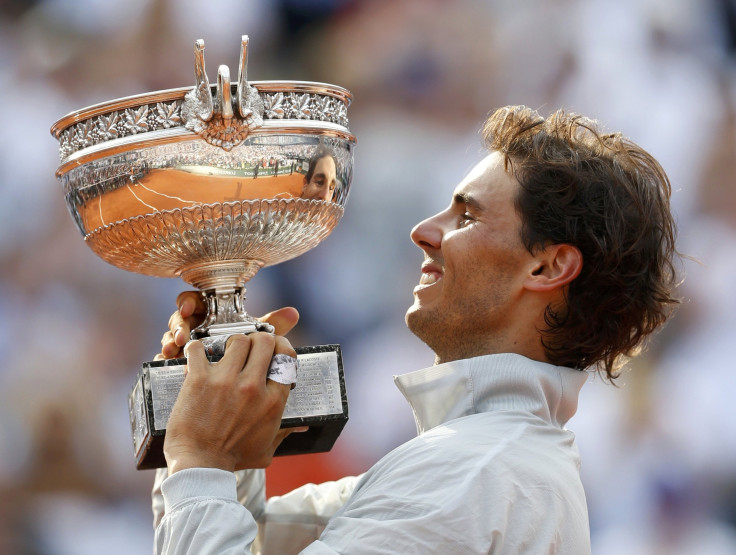VIDEO: Rafael Nadal 2014 French Open Win Over Novak Djokovic Moves Rafa One Step Closer To Roger Federer

Rafael Nadal fought back from a set down to make it nine French Open titles in his 10 visits to Roland Garros and a record fifth straight, after once again seeing off the challenge of Novak Djokovic. The win gives Nadal his 14th Grand Slam title overall, moving him level with American Pete Sampras, and now just three behind the record holder Roger Federer. With Nadal four years younger than the Swiss star, he has plenty of opportunities to further the debate about who can rightfully claim to be the greatest tennis player that ever lived.
The unfamiliar tears that flowed as he hoisted the trophy once more encapsulated what it meant to the Spaniard after being pushed to the limits at the end of a tournament where many observers had predicted his dominance on the clay in Paris would come to an end. Nadal had made a slow start to the final, allowing Djokovic, seeking the one Grand Slam title to thus far elude him, to get a precious early advantage. But Nadal showed his unmatched fighting qualities to crucially edge the second set before beginning to come closer to his best tennis and, as Djokovic started to struggle physically, claim a 3-6, 7-5, 6-2, 6-4 victory.
With so much on the line on a warm day in Paris -- weather in contrast to much of the past two weeks -- the world’s top two players struggled mentally and physically to produce their best. By the end, tennis’ two greatest warriors appeared on their last legs. With that in mind, a double fault from Djokovic was an unsurprising, if still painful, end. The quality of the contest certainly failed to reach the heights of their five-set epic in last year’s semifinals. For much of the match it appeared dominated by what was going on between the ears.
Djokovic has been desperate to complete his resume with victory in Paris but has been agonizingly denied by Nadal in the past two years. Meanwhile, Nadal knew he could well face his greatest challenge yet after his least successful buildup yet to a tournament which he has dominated since 2005. An opportunity to further cement his legacy as the greatest clay-court player of all-time loomed large as did the prospect of moving up on the overall list.
Early on both players failed to reach their potential, with Nadal particularly making uncharacteristic errors. They proved costly in the eighth game of the match when a series of wild forehands allowed Djokovic to break for a 5-3 advantage. When Nadal put a forehand long in the next game, Djokovic had the opening set. Having won the last four of the pair’s record-setting series of 42 matches, and 11 in a row when taking the opening set, Djokovic had to feel good.
And he had the chance to capitalize on his advantage early in the second set. Nadal had still to settle into the final and was failing to dominate with his trademark crushing forehands. Djokovic, though, was too tentative to take advantage. In the sixth game of the set, Nadal was able to string together some venomous forehands and duly broke to apparently signal that the top seed was had now finding his rhythm. Instead, Nadal’s errors allowed Djokovic to break back the very next game and then allow the Serbian to save a break point at 3-4. It was Nadal, though, who found the big weaponry when it counted and broke Djokovic with a blazing forehand down the line to level the match and make it a best-of-three-sets contest for the title.
Nadal carried his momentum in the third. After breaking in the opening game with some punishing hitting and with Djokovic showing signs, both with his drained face from the still blazing sun and errors on routine shots, of starting to wilt physically, it appeared the third set would be a mere precession. To Djokovic’s credit, he made it more of a battle, but when Nadal held after a grueling 10 minute game at 4-2, the set was soon his.
With Djokovic seen vomiting on the court ahead of the start of the fourth, the title appeared to be heading only one way -- and likely in a hurry. Still, it proved to be far from that straightforward. Nadal did break to go up 4-2, but by that point he was also struggling physically. And he must have feared the worst when a double fault followed by an overhead which he collapsed on to send it into the net in the next game handed the break right back.
The memories of losing the Australian Open final earlier this year to Stan Wawrinka after battling a back injury came flooding back. He still almost pulled out a win against the odds in Melbourne and this time he was somehow able to fight through to the finish line. The game at 4-4 was key, when Nadal required all his resolve to hold out from deuce. And in the next game Djokovic let a 30-0 lead slip, before, on match point, after being delayed by an awfully timed shout from the crowd he put a second serve long to see his dream slip away once more.
Meanwhile, the other side of the net, Nadal collapsed to his knees in realization of an extraordinary achievement and a furthering of a legacy that may go onto set him apart from every tennis player who ever lived.
© Copyright IBTimes 2025. All rights reserved.





















